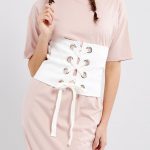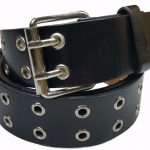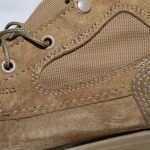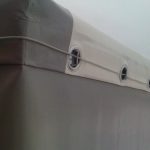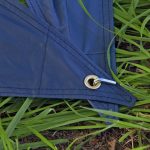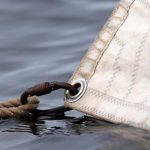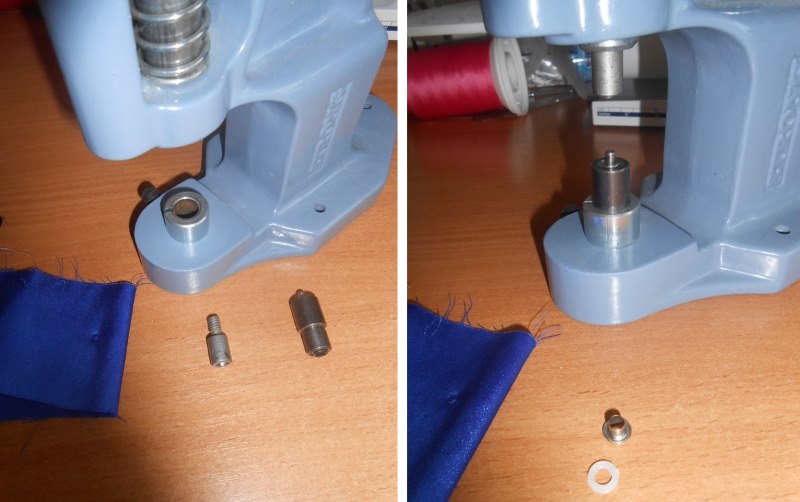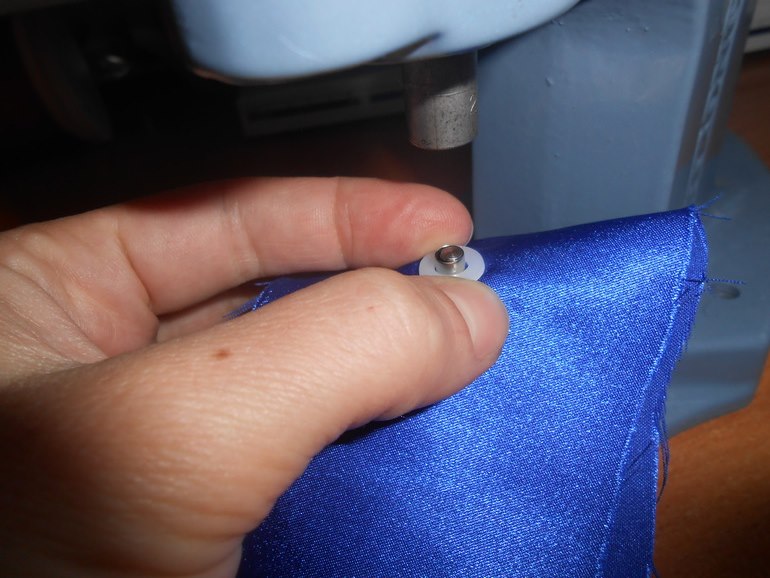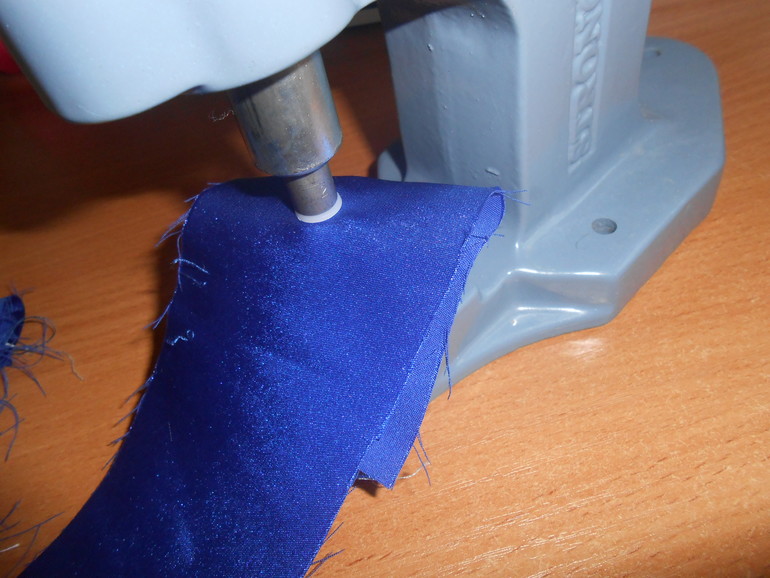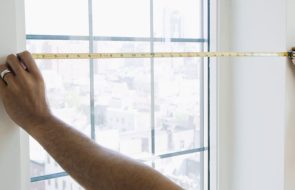Holes in clothing, shoes, and haberdashery require careful processing. After all, the reliability of the lacing and the appearance of the product depend on this. In order for the edges of the holes in the textiles to always look neat and strong, they must be fixed with eyelets. But it is very difficult to install this type of fittings manually. Therefore, special presses are increasingly used for these purposes.
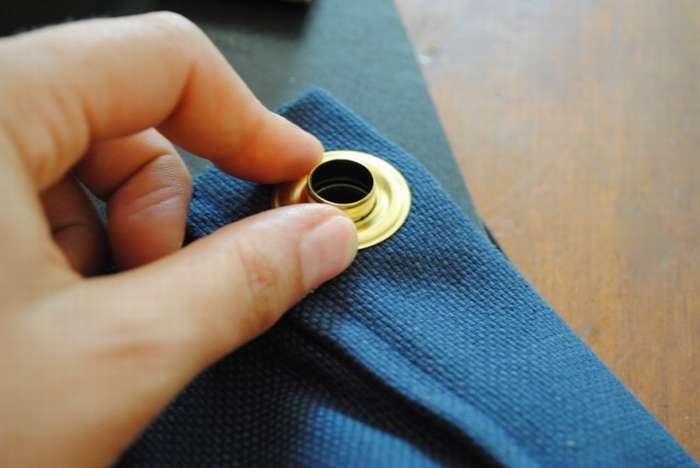
Content
What is a grommet and where is it used?
An eyelet is a special metal or plastic device designed for finishing clothes, shoes, accessories, textiles, and printed products. It is used to decorate the edges of holes made in a product for threading laces, ribbons, and tapes.
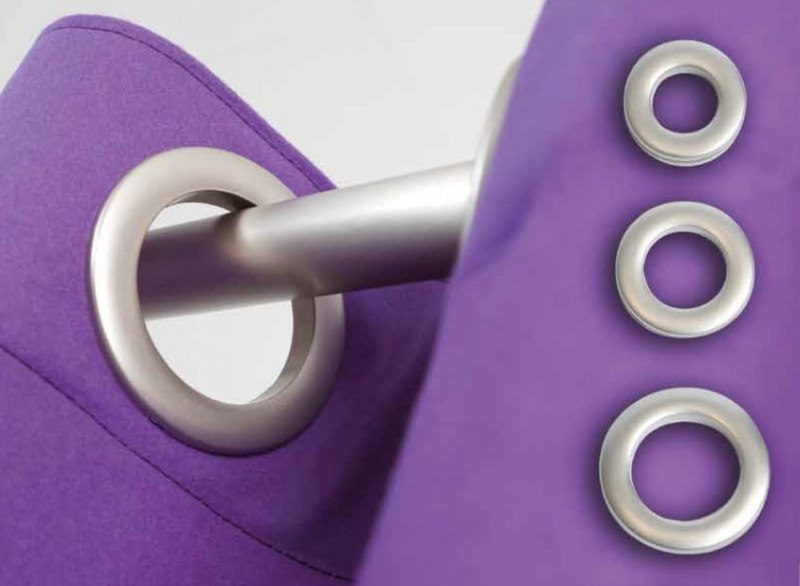
Designed to strengthen round cuts in fabric, leather, paper and other materials, preventing edges from fraying and tearing.
What does the structure consist of?
The design of round rivets is very simple. It includes only two parts - a bushing and a washer. The bushing is often called a block. It consists of an outer ring and a leg.
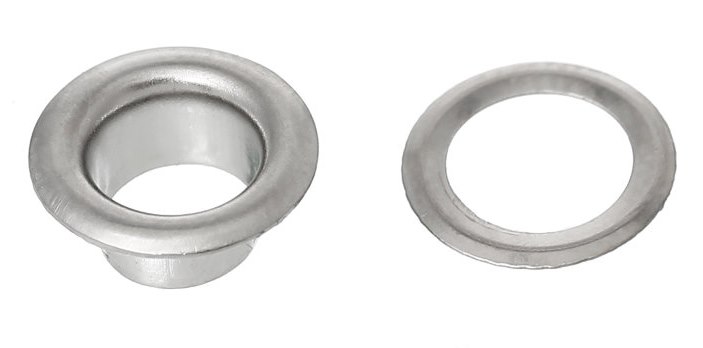
The outer part will cover the hole from the outside. The block leg is used to decorate the inside. A washer is put on it, the edges of the leg are bent and flattened.
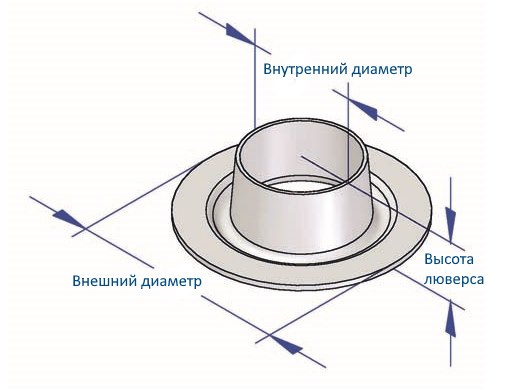
What materials is it made of?
Most often, metal is chosen as the material, but plastic is also possible. Among the most common materials:
- Steel. The metal is durable, holds its shape well, and is inexpensive. But it has a significant drawback: when exposed to moisture, steel quickly rusts.
- Brass. The metal is very soft, which makes it easy to fix the block on the product.
- Stainless steel. It is considered the best material. It is not afraid of corrosion, it is very durable and therefore has high wear resistance. The disadvantage of stainless steel is its high cost.
- Coated steel. To improve the characteristics of steel, it is often coated with other metals. This can be copper, nickel or zinc. The nickel layer is the most beautiful, but also the most expensive. Nickel is the cheapest coating, but it does not look very attractive. Copper is easily recognized by its yellowish-red hue.

Where is it used?
Sealing rings increase the strength of holes in products. At first, they were used only in shipbuilding, or more precisely, for making sails. By finishing the edge with iron rings, it was possible to achieve a more reliable fastening of the canvas and its better tension. Today, the scope of application of finishing rings is much wider:
- Sewing business.
- Shoe making.
- Haberdashery.
- Paper bags with textile handles.
- Tourist equipment.
- Curtains.
- Car awnings.
- Banner advertising.
- Flags.
- Scrapbooking.
How to install?
To install the sealing rings yourself, you will need two tools: a hammer drill and an installer. Using a hammer drill or a hole punch, make a puncture in the material.
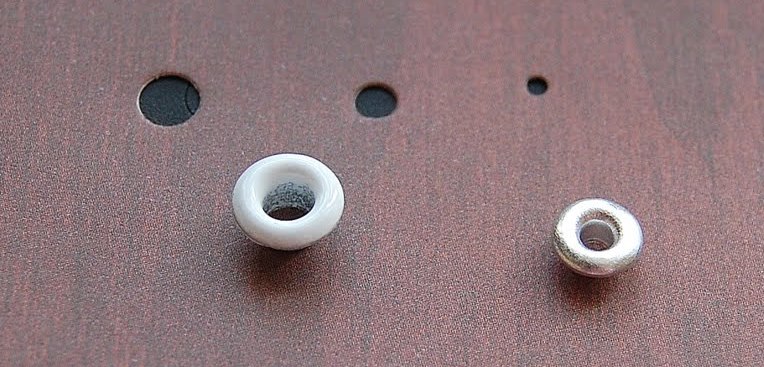
Please note! There are different types of perforators. It all depends on the material on which the holes will be punched: paper, fabric, leather, etc. When choosing the right model, be sure to pay attention to this characteristic.
According to design, perforators can be of two models:
- forceps;
- impact drill.
The pliers look like pliers, but the upper part has a wheel with attachments. By turning the wheel, you can select the desired hole diameter.
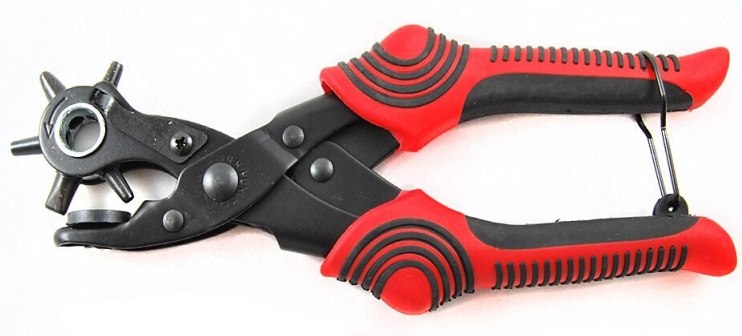
An impact drill is a rod with several attachments. In this case, installing the fittings requires a hammer and a certain amount of skill.
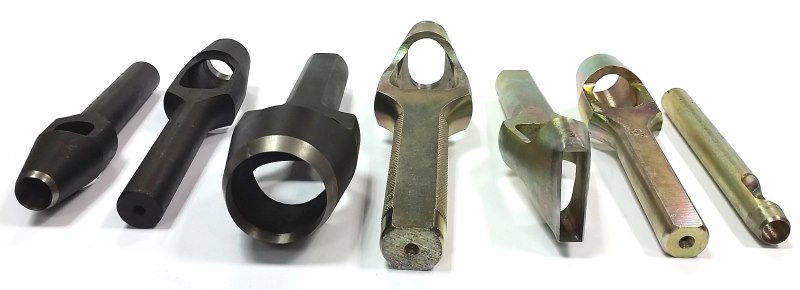
The installer also comes in two types:
- forceps;
- core.
In the first case, the bushing and washer are fastened with pliers. But there is one nuance here - each pliers model is designed for a certain diameter of the block.
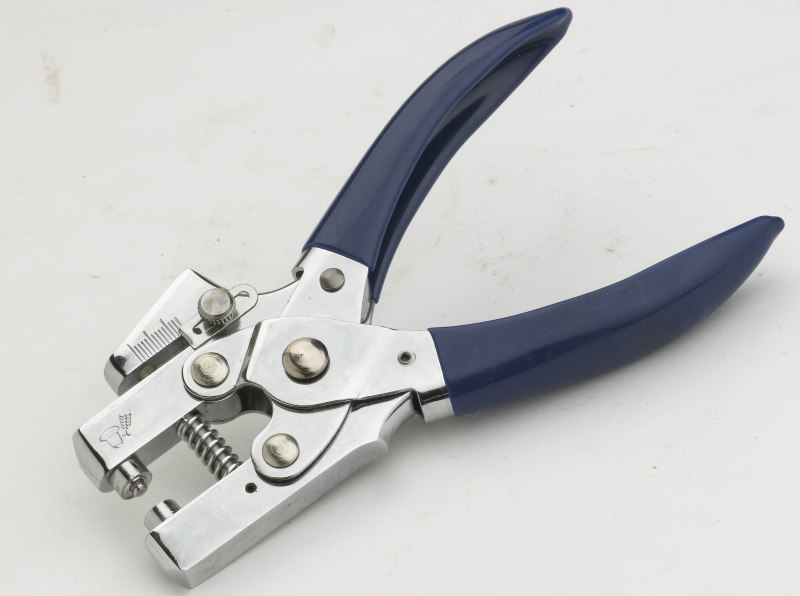
A core is a metal rod with a pointed end. It is inserted into the bushing, then by tapping it with milk, you can fix the rivet on the canvas.
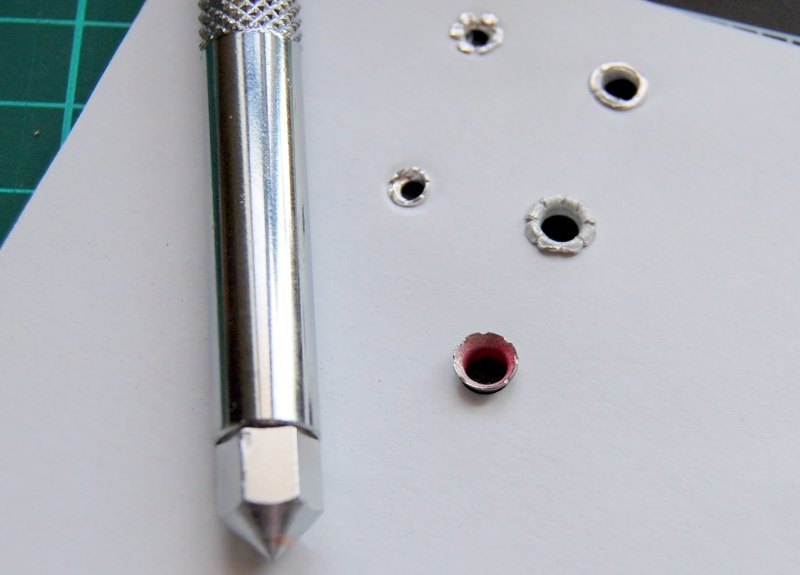
Now a combined model has appeared on the market – a hammer drill and a setter. Such a tool makes it easier to fix metal rivets.
Sealing rings are installed in several steps:
- A hole is made in the material using a hole punch.
- The sleeve is inserted into the hole.
- A washer is threaded onto the bushing leg. The material is located between the block head and the washer.
- Using the selected installation tool, the block leg is flared.
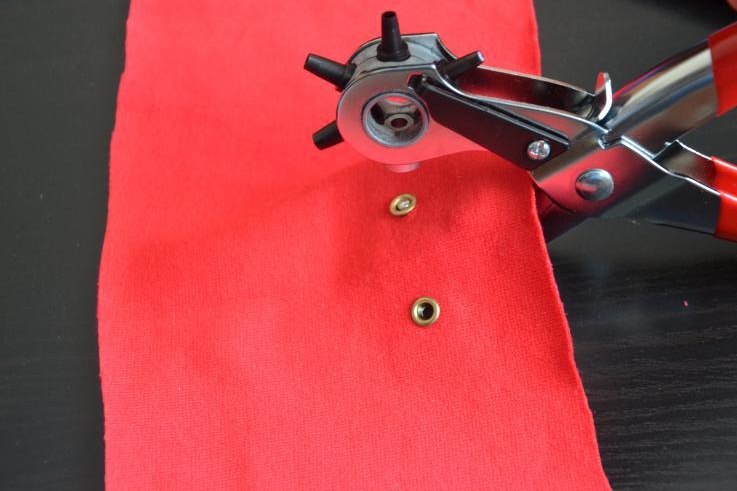
Important! If the material is elastic and stretches a lot, then the puncture diameter should be one size smaller than the sleeve diameter. The sleeve size is measured along the inner edge. But in Chinese products, the outer diameter is often indicated as the size.
Press for installing fittings
The most convenient to use is the eyelet press. Its main advantage is that you can immediately make a hole and install the metal trim. No other auxiliary tools are needed. But there is a big disadvantage - the cost of such machines is quite high.
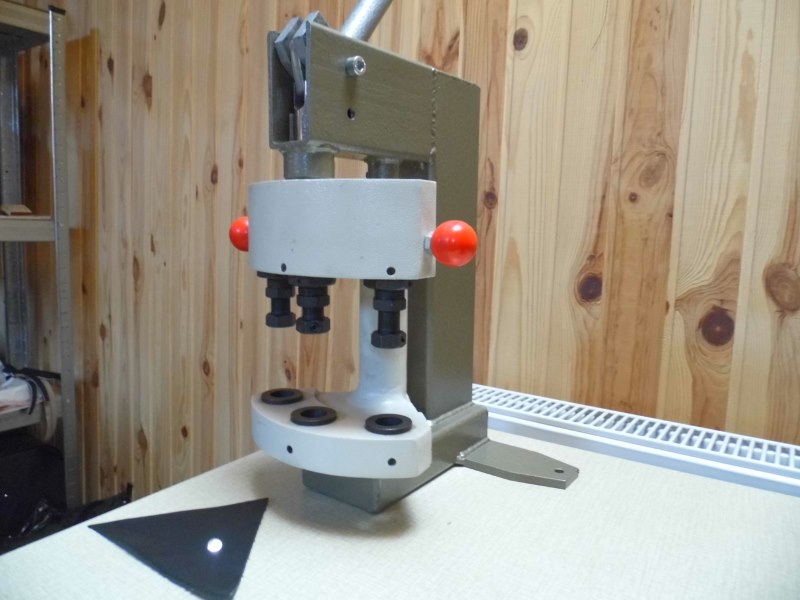
Types of press for installing eyelets
Before buying equipment for fixing fittings, you need to know about the designs, their features and functionality. There are several types of eyelet installation presses:
- Pneumatic.
- Electric.
- Manual.
Pneumatic press: description and characteristics
Pneumatic machines for installing buttons and eyelets are used as equipment for sewing workshops, large factories and enterprises manufacturing clothes, shoes, and printed products. It operates using compressed air energy. A mandatory element of the equipment is a compressor. It can be included in the kit or purchased separately. The machine can also operate if it is connected to a central pneumatic system.
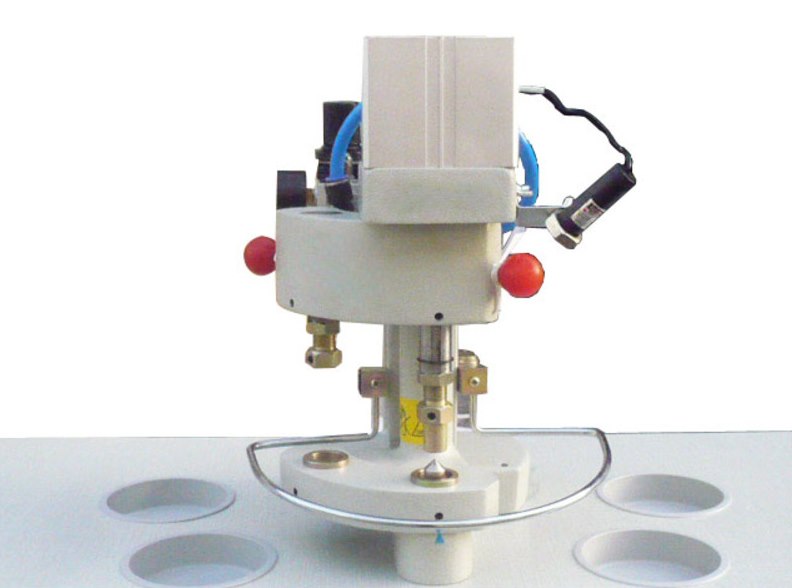
The impact force can be adjusted. The mechanism is driven by a foot drive. Some models are equipped with a laser pointer and a safety system that protects hands from injury. Sometimes the kit includes an electronic unit for automating work operations. In addition to installing rings for lacing, the equipment can also perform other operations:
- Covering buttons.
- Making holes in fabric with a punch.
- Fixing eyelets, buttons, and eyelets.
- Production of buttons with a rim.
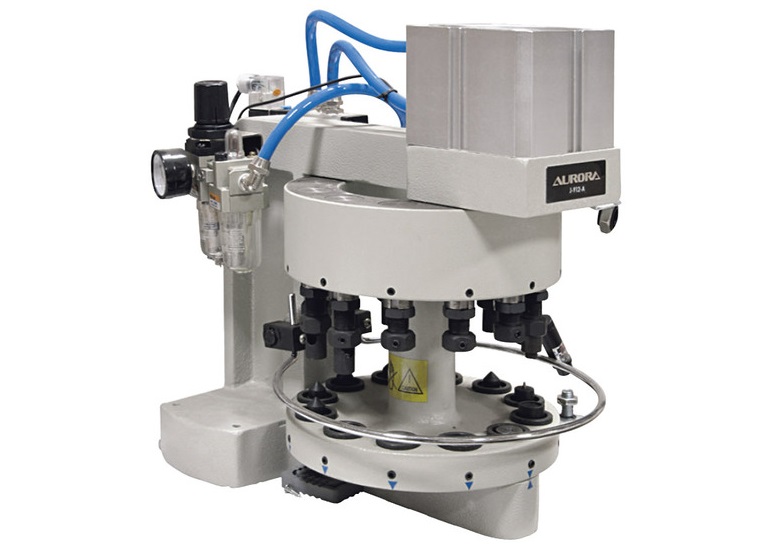
This equipment is considered universal, as it can perform many different operations. For these purposes, the kit includes special attachments.
Electric press: description and characteristics
This press for buttons and eyelets works from an electric foot drive. The machine is used when it is necessary to sew clothes or shoes in large batches. The equipment is equipped with a strike counter. This allows you to track the operator's productivity.
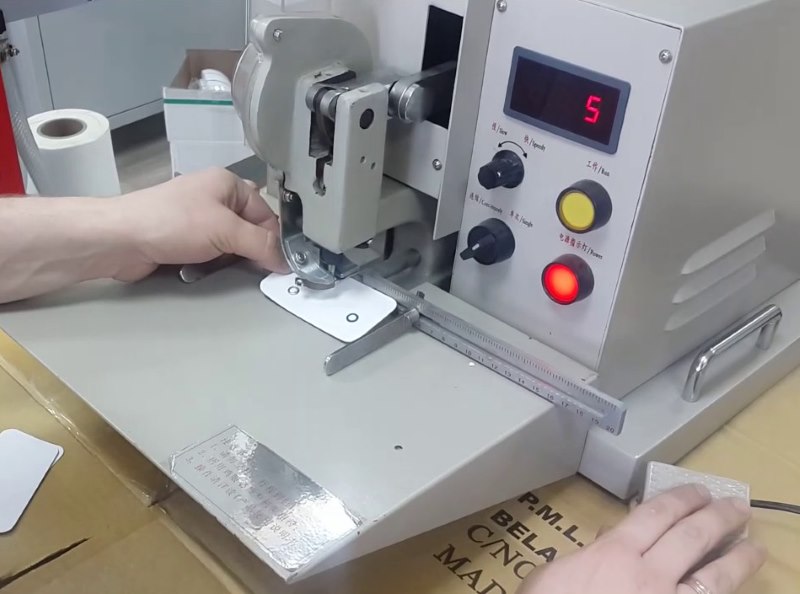
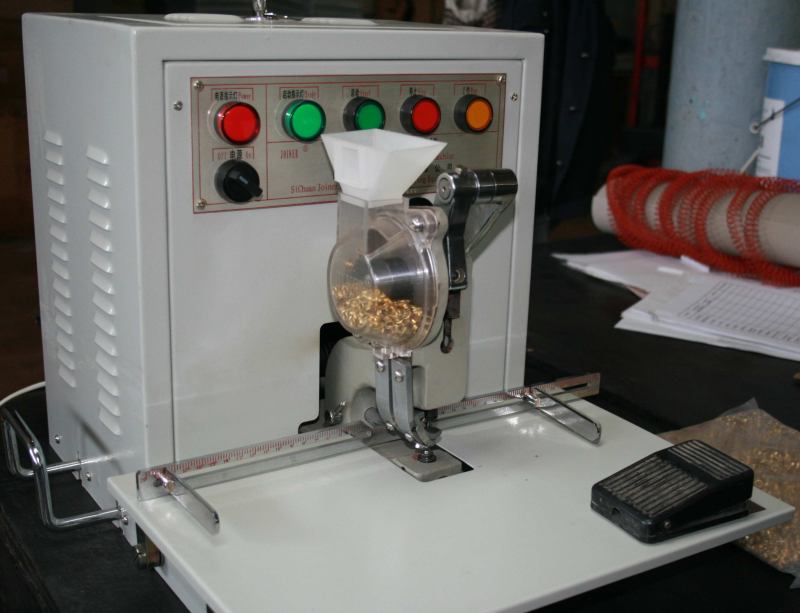
The mechanism is driven by an electromagnetic coil. The impact force is adjusted using the display buttons. The impact force can vary from 1 kg to 1000 kg/cm². To protect your hands from injury, the kit includes a special sensor that is triggered if your hand hits the work surface. Performs all the same operations as a pneumatic machine.
Hand press: description and characteristics
If we are talking about small workshops where there is no need for mass production, then a manual press for eyelets is better suited for these purposes. It allows you to qualitatively install the fittings on the product.
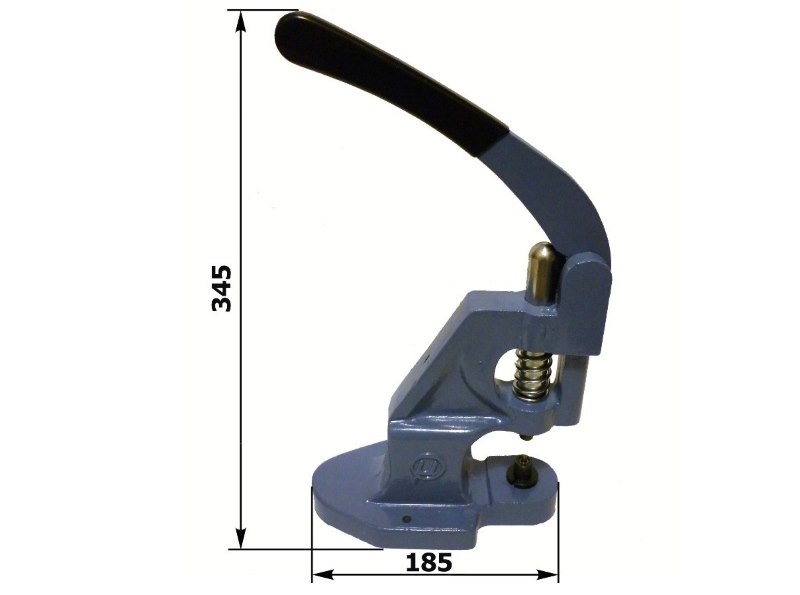
Performs a whole range of operations:
- Installing eyelets.
- Fixing other fittings: eyelets, rivets, jeans buttons.
- Covering buttons.
- Punching holes.
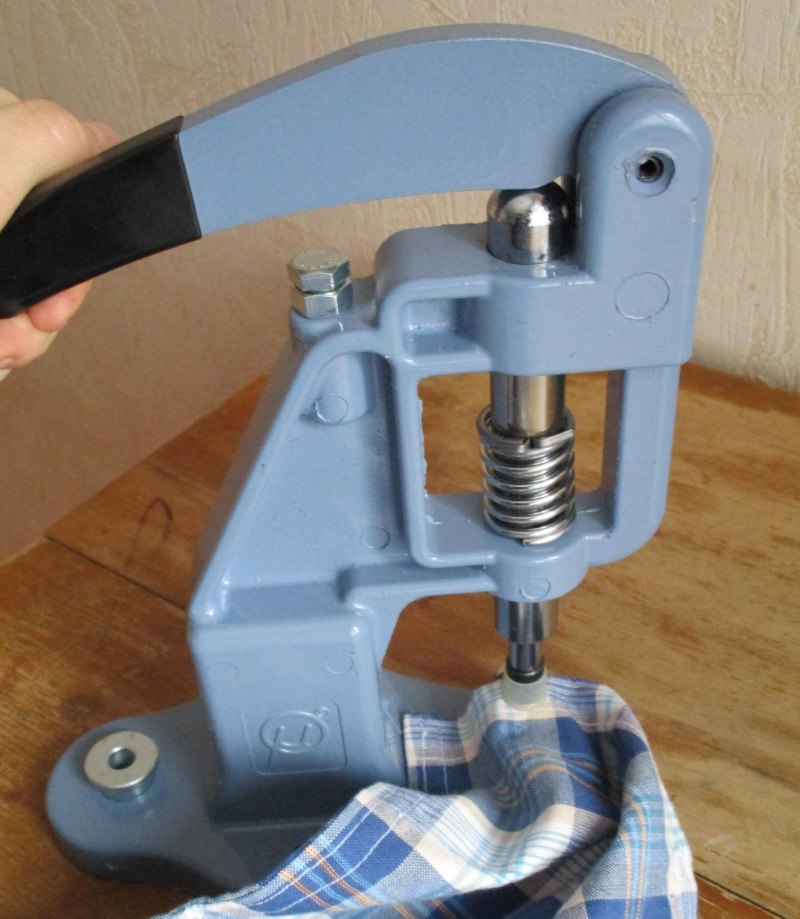
Important! When buying a mechanical machine, do not forget to purchase attachments for installing fittings. You will also need a punch with a stand. Without this, it is impossible to work on the machine, and they are usually not included in the kit.
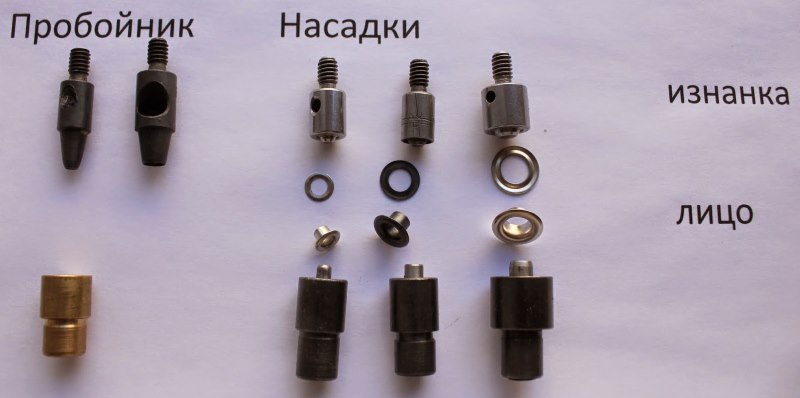
How does a manual press for rivets and eyelets work?
The machine is based on mechanics. It is activated by a lever and the physical efforts of the master. The lever presses on the striker, which in turn exerts pressure on the mechanism of the machine.
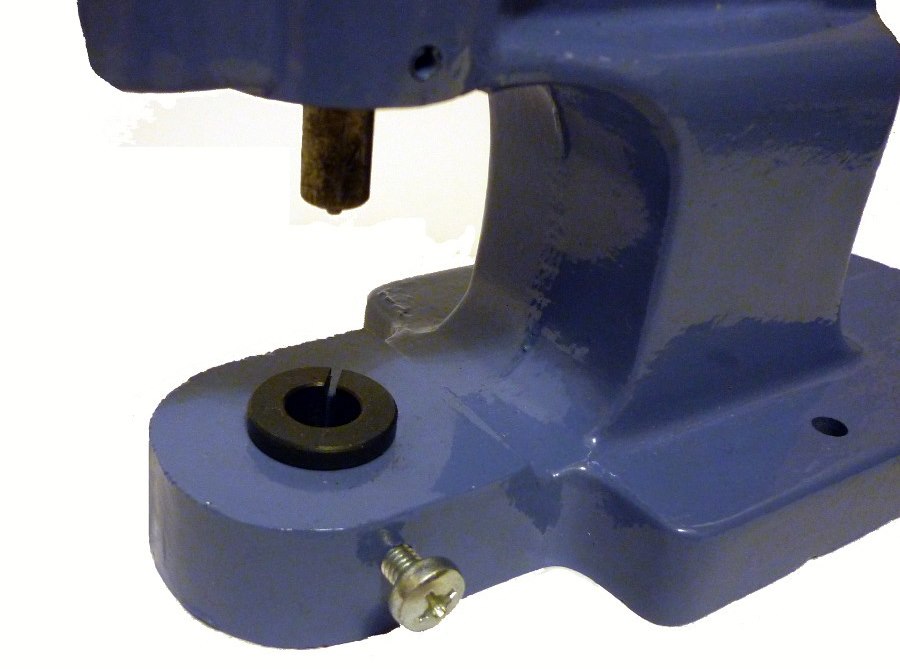
Under the force of pressure, the edge of the bushing is flared. The spring ensures that the mechanism returns to its original position.
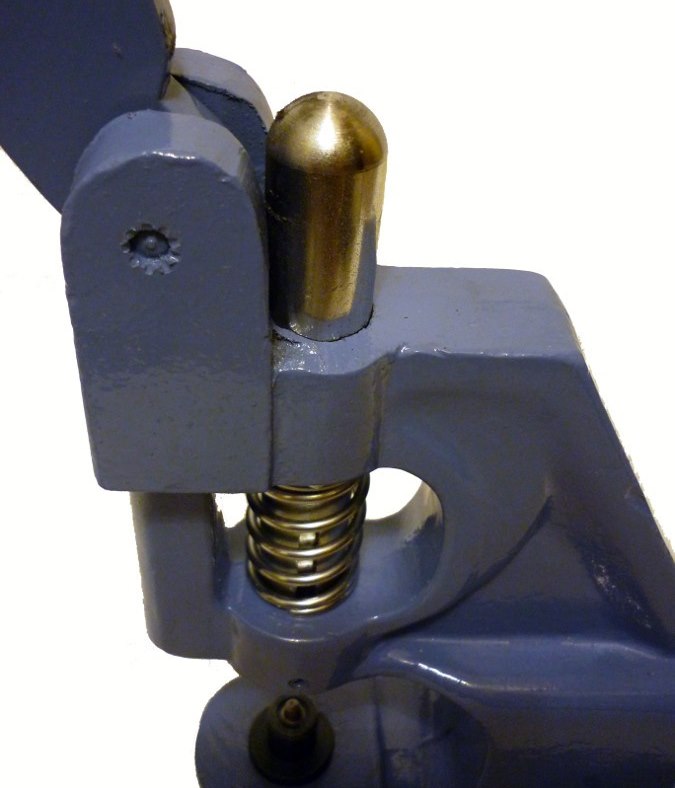
The kit includes bolts for mounting the structure on the table. Once the machine is securely fixed, you can start working:
- The threaded attachment is screwed into the top shaft of the device.
- The threadless attachment is installed into the lower part of the machine.
The diameter of the attachments is selected in accordance with the size of the eyelet - The bushing is installed at the bottom. The fabric with the hole is put on top of it.
- A washer is placed on top.
The main thing is not to confuse the back with the front side! - By pressing the lever, a metal ring is installed.
When pressing the lever, it is important not to allow the fabric to shift.
Today, the market for fittings installation equipment offers a large number of machines. But Turkish-made machines are the leaders in this area. Among the most popular brands are:
- Presmak;
- Yeten;
- MIKRON.
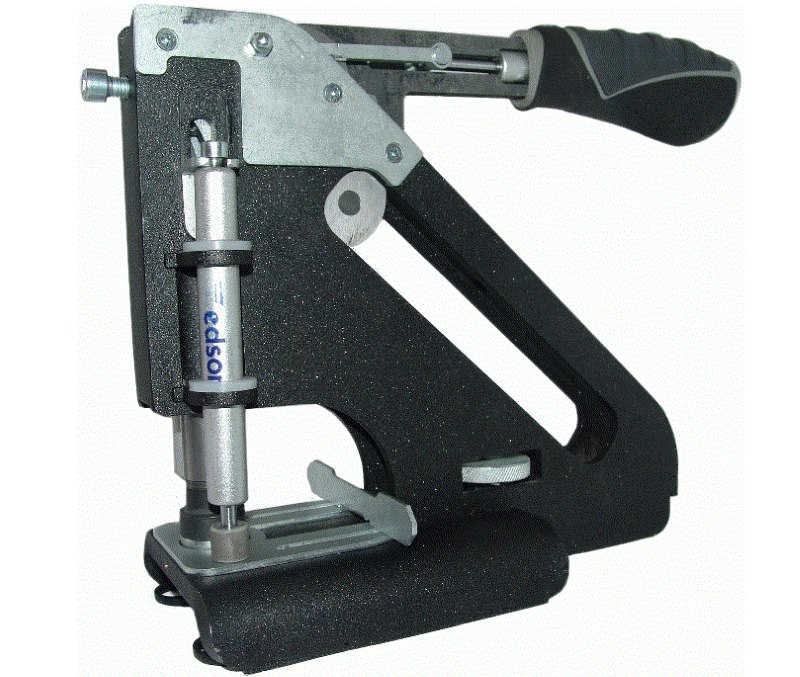
Machines for installing fittings are essential equipment for sewing and shoe workshops, large and small productions. Pneumatic and electric designs are used in large enterprises. For small workshops, manual or mechanical machines are suitable. Each of them plays an important role in decorating products with metal loops. After all, this fitting not only strengthens the holes for lacing, but often plays a decorative role.

